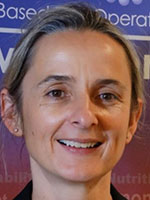Speakers

Prof. Denny LEVETT
Consultant in Perioperative Medicine and Critical Care, University Hospital Southampton NHS Foundation Trust, United Kingdom
Denny is the Professor of Perioperative Medicine and Critical Care at the University of Southampton and a Consultant in Perioperative Medicine at Southampton University Hospital NHS Foundation trust.
She is the Perioperative Medicine Lead in Southampton and leads the post operative surgical high dependency unit and the pre-operative cardiopulmonary exercise testing service. Her research interests include the use of CPET for risk prediction and to guide perioperative management, prehabilitation prior to surgery and oxygen utilisation in hypoxia. She is the clinical chief investigator of the INSPIRE trial evaluating pre-operative inspiratory muscle training to reducing post-operative pulmonary complications and is part of the Fit 4 Surgery research group working with Profs Sandy Jack and Mike Grocott in the prehabilitation trials Safefit and Wesfit. She is president of the Perioperative Exercise Testing and Training Society (POETTS) and she established and chairs the National Perioperative Cardiopulmonary Exercise Testing course in the UK.
The time between contemplation of surgery and the procedure itself offers a window of opportunity to optimise patients’ nutritional, functional and psychological state prior to surgery. Traditionally pre-operative pathways have focused on the underlying disease process and ‘fitness for surgery’ with physical pre-assessment and risk counselling occurring late in the pathway when there is little time available to intervene. Consequently a key opportunity to improve health in preparation for the physiological challenge of the surgical episode has been lost.
The period around the time of surgery is characterized by increased focus on personal health along with multiple interactions with healthcare professionals and may provide a particular opportunity for improving health in general, and physical fitness in particular. In particular they may offer an opportunity to embed sustained changes in behavior at a time when patients are particularly focused on health improving behavior.
Multimodal prehabilitation programmes may improve surgical outcome, facilitating rapid recovery from surgery and limiting postoperative functional dependence. Patient education and engagement is important if compliance with behavioural change is to be achieved and maintained. To date there is supportive evidence for pre-operative exercise training, nutritional optimization, smoking cessation and alcohol reduction. I will review the evidence the evidence supporting the importance of function capacity for surgical outcome and the impact of pre-operative exercise programmes. Further research is needed to identify the most effective elements of these complex preoperative interventions, as well as their optimum timing and duration.